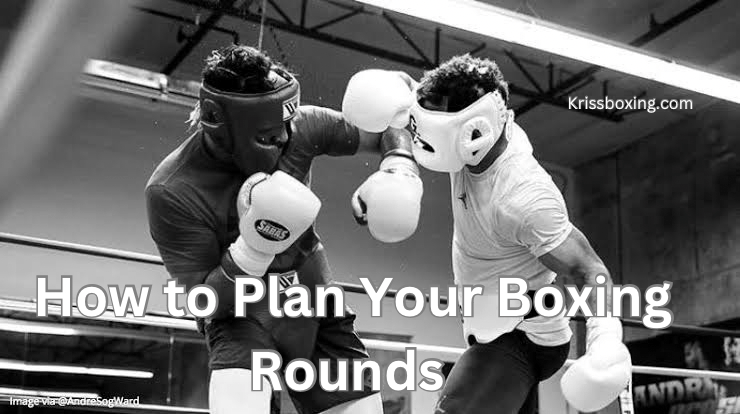In boxing, it would be safe to say that a contest is often won even before the first round is underway. Ensuring that one has a good game plan for each round is important in outdoing the opponent, managing one’s energy, and going for what one considers advantageous.
This article will look at how to manage the rounds in boxing in a bid to keep the upper hand and flexibility at all times.
How to Plan Your Boxing Rounds
A boxing match is typically divided into three phases: By breaking up the competition into the early stages, the middle stages, and the final stages, the competition can be highly exciting for the audiences.
This means that every phase requires a different approach thus the need to suit your strategy to the phase.
Early Rounds
The early goings are really about getting your foot in the door and figuring out what your rival is all about. This is the time to probe for your opponents’ soft underbelly, to manage the tempo, and to assert yourself.
Employ a jab’ to gauge your range and to constantly put pressure on your adversary. Do not attempt to use up a lot of energy; instead what is required is the setting of the pace of the fight.
Middle Rounds
This is the stage where both fighters are fully prepared and ready to go and the real aim is to make the most of the discoveries done in the first rounds. If there was a chance to pull on the threads that became loose in the course of the game when your opponent developed gaps in his defense, they should be used now.
Turn up the heat a little bit as you vary your strikes so as not to give your adversary an easy time to read you. This is also the phase where stamina comes in handy, do not spend all your energy through this phase.
Late Rounds
Some of the last rounds are the most decisive promising victory to the fighters. If you have saved your strength and done a great job in managing the fight you should be able to have the strength to either go for the knockout or to defend yourself well if you are leading in the points.
Be patient, do not take unnecessary chances, and exploit the opponent’s tiredness if you have spotted one.
Adapting to Your Opponent’s Strategy
Because boxing is such a fluid and unpredictable sport, even the best-laid plans can go to waste because your opponent will also have a plan. Success appears to be largely determined by one’s level of flexibility.
No matter how you have things planned out, be open to adjusting as the battle unfolds.
Reading Your Opponent
Be observant and notice the signs your opponent displays to see how he will be reacting during the fight. Do they prefer a particular punch string? Are they more likely to be aggressive or to be defensive? Now use this data to make small adjustments to your plan.
For instance, if the opponent opts for the retaliatory style, counterpunching them will be useful in availing the forward movement of the opponent. If they prefer to stay in a more defensive mindset, you need to apply constant pressure to penetrate the opponent’s defense.
Making Adjustments
Do not move on quickly to the next move if the first one does not work for you – adapt when you need to. This could involve varying the rhythm of your movement, the use of different sets of blows, or even a change in guard.
They believed that when other persons are involved the game plan that is used must not be very rigid for then you find yourself have lost the game.
Communicating with Your Corner
Your corner team assists you as you prepare for counter during the fight. Seek their opinion during breaks and a break can observe things that you could not notice due to intense concentration. Employ their advice as stages continue as this makes the fight interesting.
Mental Fortitude
A boxer needs to comprehend that the sport is as much about the head and the heart as it is about the muscles. Make sure you collect your nerves when you’re under pressure, rely on your training, and stick to your plan.
However, even if you grasp that a fight is not in your favor, the power of the mind may help to change something.
Finishing Strong
Hence, it is always wise to choose the proper technique with which you can end the fight and impress the sods called judges. In any of the rounds, the performers should try to save the best for the last round though they are allowed to pull off stunts in any of the performances.
This may involve egging for the final attack that will enable the team to score in the last few minutes or a show of might to ensure they do not get scored on. It remains crucial to deliver a clean round because it has been seen that low scoring can at times lose the match when the two opponents are so close together.
Frequently Asked Questions
How do I decide on my round strategy before a fight?
And your round strategy should, as ever, be built on your strengths, your enemy’s shortcomings, and the outcomes you intend to accomplish in the fight. Work with the coach to create a plan that looks at what your strength is and focuses on that.
What should I do if my round strategy isn’t working?
If your strategy does not put your opponent in a tough spot, you should simply relax and change your moves. Embrace the wisdom of your corner, switch up, and go for the psychology of matching your opponent’s style. A boxer needs to say both: to be flexible.
How can I conserve energy throughout the fight?
Pacing yourself is crucial. Manage the early combat in such a manner that you don’t waste your energy too much, the aim is to gain control. During the fight, ration the output in order you save energy for the later rounds of the battle.
Why is it important to adapt to my opponent’s strategy?
It’s not surprising because boxing is a dynamic sport and the opponent is going to be thinking just as actively as you are. Their ability to bend to you is an advantage, and you will see gaps that weren’t there before and avoid their attempts.
How do I maintain mental focus during a fight?
Be where you are, believe in your training, and follow the instructions of your coaches. They should focus on implementing the strategies laid down on the dais while being prepared for a change of course. Mental toughness is crucial in the ring to be able to dominate and make the right choices.
Conclusion
Deciding how you want your boxing rounds to be will not only involve how many punches a boxer will land; it also involves strategy, flexibility, and mental strength.
That way, knowing the continuous phases of a fight, building up an individual strategy, and being ready to bring changes to it, you can remain the commander of the fight until the final bell.
Regardless of whether you are an amateur or professional boxer, if you do not fully comprehend in-ring psychology, then your performance in the boxing ring will not be impressive and your chances of winning the bout will be minimal.


